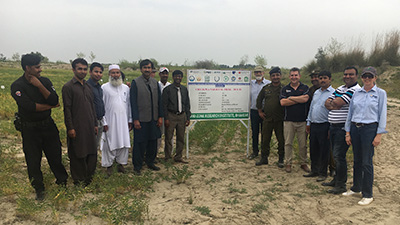Issue 2 2019
Table of Contents
- From the Director
- Pulse focus for visit to Pakistan
- Debunking the myth about wheat breeding and allergies
- Honours research underway
- Opportunities abound in Munich for FGC researcher
- PhD student on stage at evoke Ag
- FGC photos and events
From the Director
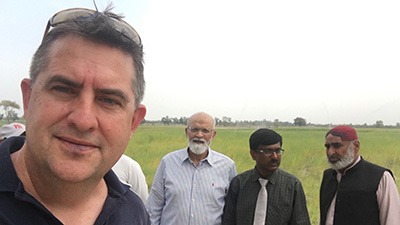 As the cool weather sets in things are ‘hotting up’ at the Functional Grains Centre in preparation for upcoming events. Students and postdoctoral researchers are busy preparing abstracts for the Summer Grains Conference to be held on the Gold Coast in July. This event will not only see us escape Wagga’s cold winter, it will also provide an opportunity to bring the team together to engage in our annual retreat activity.
As the cool weather sets in things are ‘hotting up’ at the Functional Grains Centre in preparation for upcoming events. Students and postdoctoral researchers are busy preparing abstracts for the Summer Grains Conference to be held on the Gold Coast in July. This event will not only see us escape Wagga’s cold winter, it will also provide an opportunity to bring the team together to engage in our annual retreat activity.
We were very excited to see Chris Florides submit his thesis earlier this year and are now anxiously waiting to see what the examiners think of his work on wheat allergens. We’ve also had a boost in student numbers with the addition of five new Honours students, Jack Murphy, Borkwei Ed Nignpense, Gideon Kang, Haben Melke and Heidi Bochenek. We will also have Raihan Muhabub joining us as an Honours student in the middle of the year.
Earlier this year, Esther Callcott did a fantastic job representing the FGC at the Evoke Ag event in Melbourne. James Lee has progressed to the Charles Sturt University finals of the Three Minute Thesis (3MT) competition. We wish him well with his presentation.
The rice team had enjoyable visit to the annual industry field day at Jerilderie in March. The team received some useful feedback on the posters they presented. It was also an excellent opportunity to get into the paddock learn about some rice production issues.
I hope you enjoy reading more about the adventures of the FGC team in this newsletter.
Professor Chris Blanchard
Photo caption: Professor Chris Blanchard and the team in Pakistan
Pulse focus for visit to Pakistan
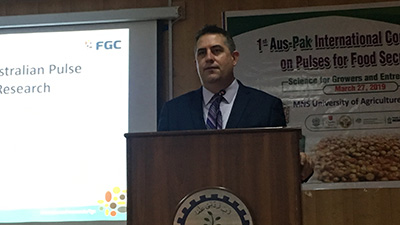 Researchers from the Functional Grains Centre (FGC), Professor Chris Blanchard, Associate Professor Gavin Ramsay and Dr Ata ur-Rehman, and research collaborator Ms Penny Heuston from Heuston Agronomy travelled to Multan, Pakistan in March.
Researchers from the Functional Grains Centre (FGC), Professor Chris Blanchard, Associate Professor Gavin Ramsay and Dr Ata ur-Rehman, and research collaborator Ms Penny Heuston from Heuston Agronomy travelled to Multan, Pakistan in March.
The visit was part of the project that aims to increase the productivity and profitability of pulses in Pakistan, funded by the Australian Centre for International Agricultural Research (ACIAR).
The team attended the 1st Australia-Pakistan International Conference on Pulses for Food Security, with Professor Blanchard and Professor Ramsay delivering presentations.
The conference was hosted by MNS University of Agriculture in Multan and included an ‘Ideas Fest’ where students from surrounding institutions competed to develop innovative pulse-based foods.
Out into the field
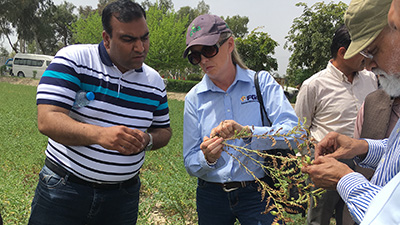 While in Pakistan the team also visited project field sites in Bhakkar.
While in Pakistan the team also visited project field sites in Bhakkar.
Professor Blanchard said, “It was great to have the opportunity to speak with farmers who told us that our project is already having a positive impact on pulse production in the area.”
The visit to Bhakkar also included the Arid Zone Research Institute to see breeding and agronomy field trials.
Debunking the myth about wheat breeding and allergies
New research has debunked the myth that all early varieties of wheat were less allergenic than the varieties grown on Australian farms today.
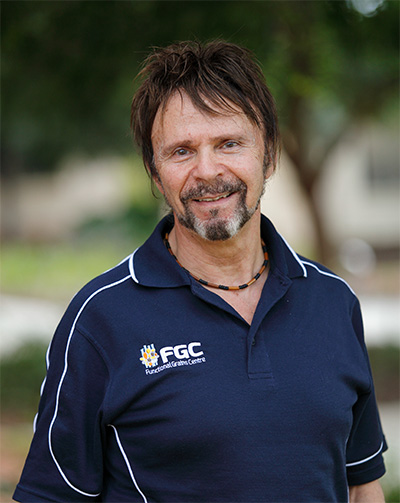 Charles Sturt University PhD candidate, Chris Florides has investigated 170 wheat varieties as part of his research through the Australian Research Council (ARC) Industrial Transformation Centre for Functional Grains.
Charles Sturt University PhD candidate, Chris Florides has investigated 170 wheat varieties as part of his research through the Australian Research Council (ARC) Industrial Transformation Centre for Functional Grains.
“Wheat allergies or gluten intolerance has become a key talking point, not only for people who have diagnosed allergies or consumers who eat gluten-free, but also for wheat breeders and food processors,” Mr Florides said.
“If you search the internet or social media there’s a lot of speculation that early wheat varieties were not immunogenic and that modern genetic techniques have created wheat varieties that are more allergenic.
“My research examined the allergenicity of wheat varieties grown in Australia from 1860 to 2015, including some original varieties brought from England that were bred to suit Australian conditions.
“The study found that one of the most allergenic varieties was one grown in the 1800’s.”
Mr Florides has also developed a diagnostic method and created data bases with information on the allergenicity of these wheat varieties.
“I found there is variation in the levels of allergenicity and it’s hoped varieties with low content of Immunoriactive proteins can now be used in wheat breeding programs and the ones with high content avoided,” Mr Florides said.
“The research also found that the climate plays a significant role on the expression of Immunoriactive gluten proteins in wheat.
“Some varieties for example can synthesise more immunogenic proteins in hot weather and vice versa.
“It is not possible to develop completely non allergenic wheat because the gluten proteins, which are responsible for the immunogenic effects of bread and other wheat products, are necessary for the functionality of the flour used to make these products.
“But I hope that my research will contribute to the development of low-allergenic wheat varieties that could be made into products suitable for people who have mild gluten intolerance.”
FGC Director Professor Chris Blanchard said, “This is an example of the research at the Functional Grains Centre that’s responding to the interest that consumers have in the impact of food on their health. Ultimately developing products to meet consumer demands will benefit the entire grains value chain.”
The research has been supervised by Professor Chris Blanchard, Dr Thiru Vanniasinkam, and Dr Frank Bekes from Charles Sturt University, Dr Angela Juhasz from Edith Cowan University and Dr Russell Eastwood from Australian Grain Technologies (AGT).
Mr Florides has now submitted his thesis and his results will soon be published.
“I have enjoyed tremendously the work and the people I worked with. I love research and it is now my intention to continue pure research on the same or similar topic,” he said.
Honours research underway
The Functional Grains Centre provides opportunities for students to undertake Honours research projects, working closely with our scientists.
Let’s meet some of them.
Jack Murphy
Charles Sturt Bachelor of Science (Honours) student Jack Murphy is investigating the effect of rice processing on the digestibility of rice starch in vivo.
His research is particularly focused on the variety Reiziq and involves a clinical trial to compare the in vivo digestibility of rice that has been processed in different ways; brown (wholegrain) rice, white (de-hulled) rice, and retorted rice (that is rice that is cooked and allowed to cool).
“It has been a steep learning curve so far but I am enjoying finding out what it takes to be a researcher and developing new skills,” Mr Murphy said.
“I am looking forward to the challenges and experiences of the rest of the journey.”
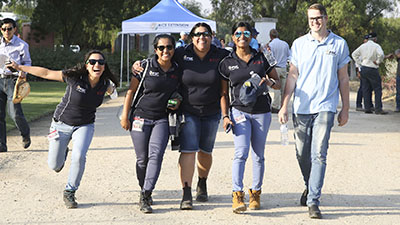 Mr Murphy has also participated in the 2019 Rice Industry Field Day, held at Old Coree near Jerilderie. He is pictured with PhD students Michelle Toutounji, Nancy Saji, Esther Callcott, Shiwangni Rao and Jack Murphy (photo courtesy of AgriFutures Australia and RGA)
Mr Murphy has also participated in the 2019 Rice Industry Field Day, held at Old Coree near Jerilderie. He is pictured with PhD students Michelle Toutounji, Nancy Saji, Esther Callcott, Shiwangni Rao and Jack Murphy (photo courtesy of AgriFutures Australia and RGA)
“This was actually my first time on a rice farm. I learnt a lot about rice, how it is grown, who grows it, and the challenges faced by the industry.
“It was a good experience that provided me with a better understanding of the crop and broadened my understanding of my own project,” Mr Murphy said.
Mr Murphy was awarded an Honours scholarship by the Graham Centre for Agricultural Innovation, read more here.
Heidi Bochenek
Charles Sturt Honours student Heidi Bochenek completed an undergraduate degree in Medical Science, with
a specialisation in Pathology in 2018.
“I developed a strong passion for research during my degree and through volunteering as lab assistant.
Ms Bochenek’s Honours research is focusing on the anti-cancer effects of Chickpea water and Chickpea phenolic extracts on colorectal cancer cells.
“It combines my two research passions; cancer research and natural products and therapies,” she said. “I hope to pursue a career in research and continue on to complete a PhD”.
Borkwei Ed Nignpense
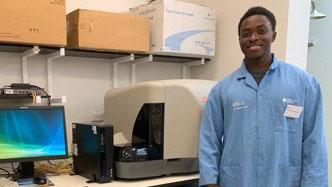 Charles Sturt Honours research student Borkwei Ed Nignpense grew up in Ghana, West Africa and migrated to Australia in 2008.
Charles Sturt Honours research student Borkwei Ed Nignpense grew up in Ghana, West Africa and migrated to Australia in 2008.
He has a degree in Biomedical Science from the University of Tasmania and has worked as a multidisciplinary medical scientist at the Dorevitch pathology lab in the South West Healthcare in Warrnambool Victoria before joining the FGC.
“My project is looking at the impact that polyphenols from black sorghum extracts have on platelet aggregation and the generation of microparticles from platelets,” Mr Nignpense said.
“I’ve been collecting blood from healthy volunteers to evaluate if sorghum extracts inhibit the aggregation of platelets in whole blood in vitro.
Opportunities abound in Munich for FGC researcher
Career development, international travel and networking: Functional Grains Centre PhD student Ms Rachael Wood jumped at the chance to take part in the Research Opportunities Week at the Technical University of Munich (TUM) in Germany.
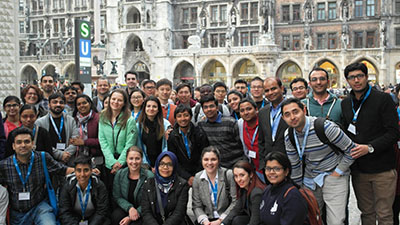 Ms Wood was one of 50 young scientists from around the world selected to take part in the five-day event in April.
Ms Wood was one of 50 young scientists from around the world selected to take part in the five-day event in April.
She said it has given her an insight into postdoctoral research opportunities in Germany and a foot in the door at the University.
“I visited different research facilities at the university, learnt about potential postdoctoral funding opportunities and met with past ROW participants and Technical University of Munich fellows.
“The week also included a city tour of Munich, networking dinners and a tour of the world’s oldest brewery which is a part of the Weihenstephan campus, with a few tastings included.”
Ms Wood’s PhD research at the FGC is investigating how rice grain quality is influenced by on-farm practices.
“It was nice to network with other young scientists and professors from completely different disciples to mine.
“Now I am a ROW participant I’m also eligible for the Technical University of Munich Foundation Fellowship which provides funding for one-year and the freedom to work on your own research.
“I would highly recommend the week if you are thinking about conducting postdoctoral study in Munich,” Ms Wood said.
Read more about the program here. https://www.tum.de/en/research/postdocs/research-opportunities-week/
PhD student on stage at evoke Ag
Functional Grains Centre PhD student Ms Esther Callcott was selected to present her research in a five-minute pitch to the AgriFutures Australia evoke Ag conference in Melbourne in February.
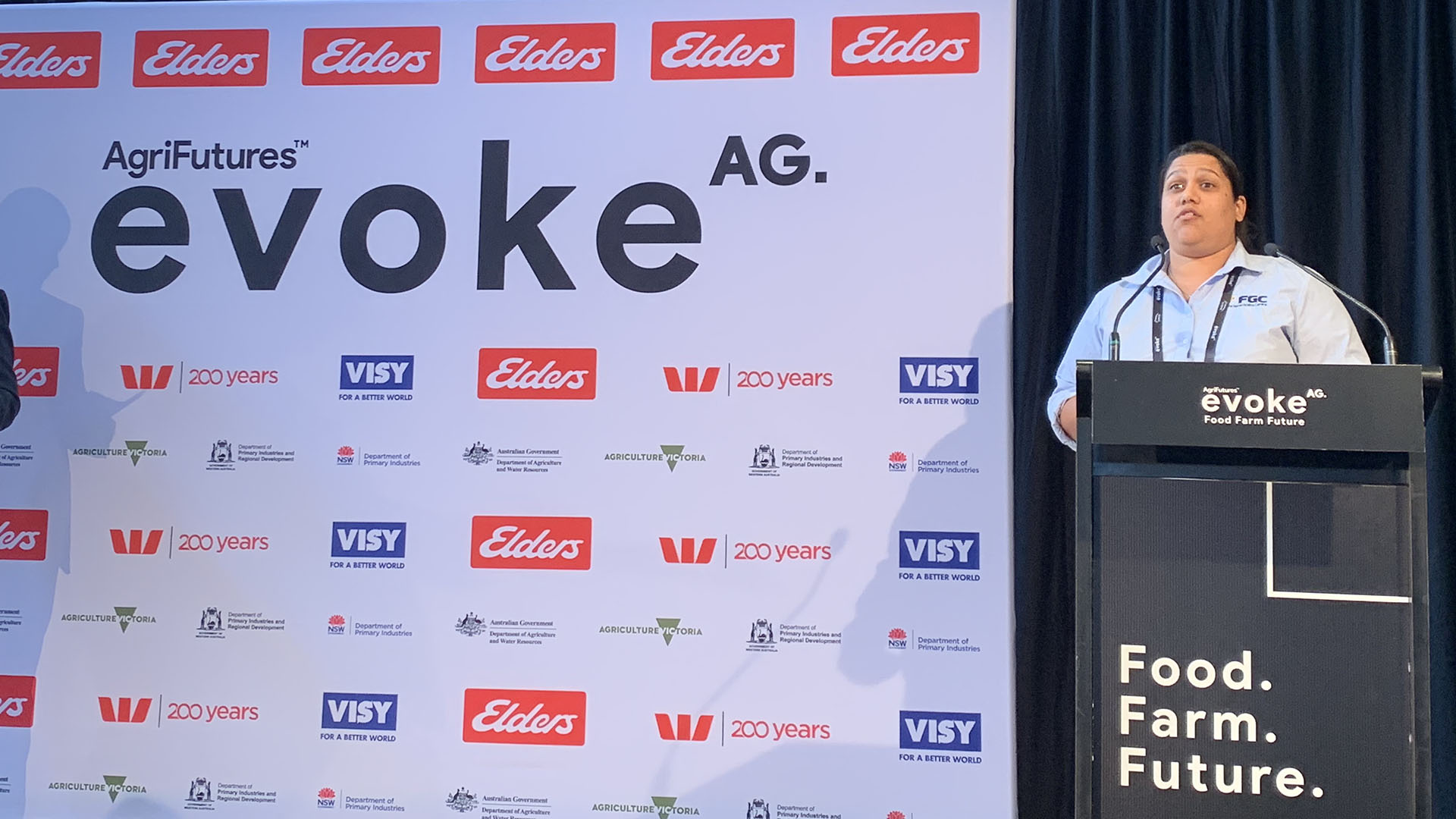 “Presenting at evoke Ag was a fantastic opportunity to showcase agricultural research to a dynamic audience and highlight the importance of research in the agricultural sector,” Ms Callcott said.
“Presenting at evoke Ag was a fantastic opportunity to showcase agricultural research to a dynamic audience and highlight the importance of research in the agricultural sector,” Ms Callcott said.
Ms Callcott’s research is examining the health benefits of coloured rice, in particular the antioxidant and anti-inflammatory potential.
The evoke Ag conference focused on innovative technology and research discussing issues such as Indigenous bioethics, alternative protein sources and the future for the agri-food sector.
“This high-tech event also showcased mini-helicopters used in monitoring paddocks, deep-fried crickets and chocolate with meal worms and ants as an alternate protein source, and the upcoming young leaders in agriculture” Ms Callcott said.
“The conference also presented a unique segment called the ‘Pitch Tent’ which gave farmers the opportunity to pitch their problem to professionals to help find a solution.
“The problems ranged from database and software issues when selling livestock to a farmer wanting a detector to determine whether his bee hives contained a fatal microbe.
“The pitch tent was an engaging segment that allowed many to learn of the problems currently faced by Australian farmers.
“Evoke Ag was action-packed with ideas of innovation blooming in every conversation on how to improve Australian agriculture,” Ms Callcott said.
FGC photos and events
Sharing knowledge
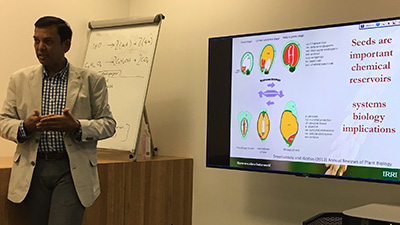 Dr Nese Sreenivasulu, who currently oversees the grain quality operations at the International Rice Research Institute (IRRI) in Los Baños, Laguna in the Philippines visited the Functional Grains Centre in May. During the visit he gave a presentation about his recent research on grain quality.
Dr Nese Sreenivasulu, who currently oversees the grain quality operations at the International Rice Research Institute (IRRI) in Los Baños, Laguna in the Philippines visited the Functional Grains Centre in May. During the visit he gave a presentation about his recent research on grain quality.
Building capacity
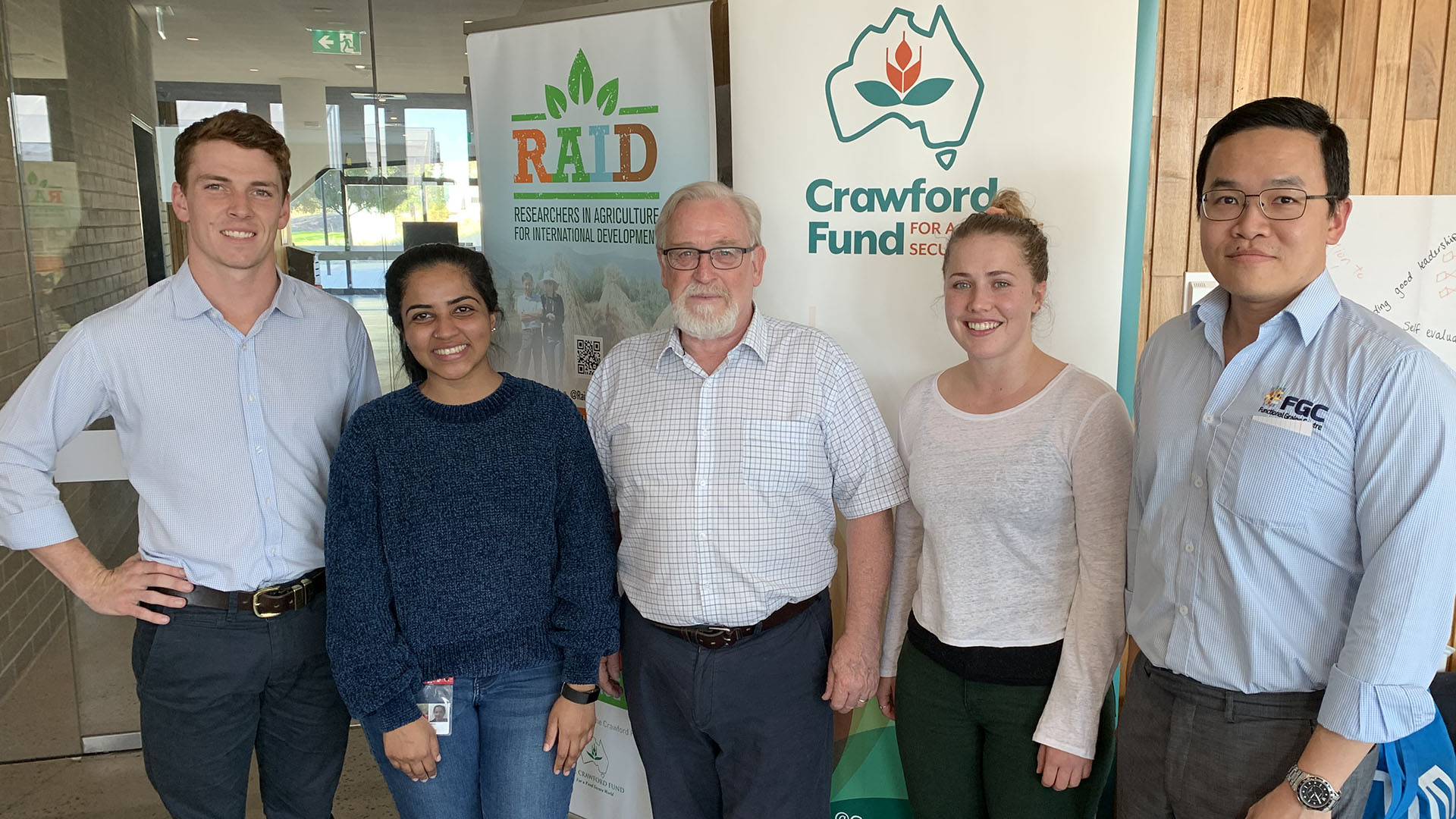 A number of young researchers from the Functional Grains Centre took part in a workshop hosted by The Crawford Fund and Researchers in Agriculture for International Development (RAID) that aimed to build the capacity of the next generation of agricultural research leaders.
A number of young researchers from the Functional Grains Centre took part in a workshop hosted by The Crawford Fund and Researchers in Agriculture for International Development (RAID) that aimed to build the capacity of the next generation of agricultural research leaders.
FGC PhD student Nancy Saji said, "The workshop provided a great opportunity to improve existing leadership and management skills through a series of seminar style presentations, group discussions and fun activities.
"Some of the key objectives addressed in this workshop included self-evaluation, people management skills, conflict management, time management strategies and effective ways to evaluate, plan and manage projects.
"More importantly, it was a great opportunity to network with a wide cohort of people and hear about updates and developments in the agricultural industry from both an Australian and international perspective."



